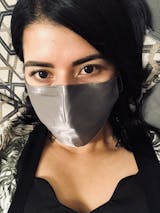Society is becoming increasingly aware of the ingredients they expose themselves to in their home. With this realization, many of us are starting to opt for more natural ingredients and formulations in our cosmetics.
This is because most of us assume that natural ingredients are safer to use, better for our health, and better for the planet. Yet, some natural ingredients used in the cosmetics industry are incredibly toxic. Not only that, but as the population and demand grow, we are also facing a shortage of natural resources.
This article will discuss the misconception that natural ingredients are always safer. It'll look into how health awareness is driving overconsumption of natural ingredients. And it'll highlight ways we, as consumers, can shop more responsibly by supporting brands that operate sustainably.
Our Overconsumption Problem
Scientists have been saying it for decades; if we don't implement strategies today to counteract our global overconsumption problem, we will eventually run out of resources (1,2). Many experts have also been warning us of climate change for years. Despite this being a concern for some time, corporations and governments have failed to do anything about it until now.
The growing human population is putting a strain on Earth's ecosystems. According to one study, even if the world imposed a one-child policy on everyone and were hit by several catastrophic mortalities, we'd still likely have between 5-10 billion people on Earth by 2100 (3).
Human-driven operations continuously threaten our environment, such as agricultural practices, fishing, species introductions, and pollution (3). It's become apparent that without progressive steps—particularly from affluent citizens, according to this study (1)—our future on Earth is looking rather bleak.
Health Awareness is Driving Overconsumption
Since consumers have become more conscious of ingredients they're exposing themselves to, natural ingredients are now preferred over synthetics. This is because most of us believe that natural ingredients are safer for our health and synthetic ingredients should be avoided.
As stated in the opening paragraph, this is a common misconception. Not all natural ingredients are safe for humans, and not all synthetic ingredients are harmful.
Many natural ingredients possess elements that are toxic to humans. One study found that toxic components exist equally—if not higher—in natural ingredients than they do in synthetics (5).
Let's use botulinum toxin (BTX) as an example. Botulinum toxin—the main ingredient used in Botox®—is a protein naturally found in bacteria spores. It is the most toxic ingredient known to man and over a million times more toxic than the most toxic synthetic ingredients—except for dioxin (5).
Bone loss has been reported in certain medical cases where higher doses of Botox® were injected into jaw muscle (known as TMJD) to reduce pain and tension (14)—yikes! Still down for that Botox® injection?
Another naturally-derived ingredient that you may have heard of is carbon black. This resource is made from petroleum, a natural resource extracted from the Earth. Petroleum is put through a combustion method and further refined. It eventually becomes a fluffy, pure black powder, so it's popular in certain makeup products, like mascaras and eyeshadows.
The issue with black carbon is it's usually contaminated with heavy metals like arsenic, lead, and mercury, among other things. Although these are all natural ingredients, they can also be very toxic to humans, with known carcinogenic properties. The nanoparticles of carbon black are also often small enough to be absorbed by the skin, which is another cause for concern (5).
Carbon black is not always labeled as such, making it hard to identify. It has been labeled as D & C Black No. 2, acetylene black, channel black, furnace black, lamp black, and thermal black. My suggestion is to avoid it at all costs.
Here are some top eye makeup products that contain carbon black (7):
Thrive Causmetics eyeliner
Estée Lauder Sumptuous Extreme Lash Multiplying Volume mascara
Too Faced Better Than Sex Volumizing mascara
Huda Beauty Legit Lashes Double-Ended Volumizing and Lengthening mascara
Kat Von D Vegan Beauty Tattoo eyeliner
Tarte Tarteist Double Take eyeliner
L'Oréal Infallible Flash Cat Eye waterproof liquid eyeliner
Urban Decay Cosmetics 24/7 Glide-On eyeliner pencil
Many brands are using safer alternatives to carbon black in their makeup. Can you guess what many of them are using instead? Yep! Synthetic-made minerals. Why? Because they don't contain heavy metals, and the quality can be controlled in a lab.
Another study done on the International Nomenclature of Cosmetic Ingredients (INCI) for "inventory... of ingredients employed in cosmetic products" enrolled 655 natural substances in a database for classification and labeling and classified 365 of them as hazardous substances (6).
Some other natural ingredients to avoid in your beauty products include:
- Animal-derived musk - added as fragrance (13)
- Mercury - used as a skin lightening agent and a preservative.
- Mineral oil - used as a conditioning agent in many products.
- Formaldehyde - used as a preservative in products like nail polish.
Safety aside, natural ingredients are also not always as sustainable as synthetics. Think about palm oil, for example. This resource is one of the most commonly used ingredients in cosmetics and food.
In Borneo, where most of the world's palm oil comes from, the demand for palm oil has been responsible for entire rainforests being burnt down and desecrated to make way for palm oil plantations. You can watch a digital timelapse infographic that shows the progression of the rainforests' destruction over the years here.
But it isn't only the environment that suffers. Orangutans have also become endangered, as their home in those rainforests has been destroyed (15). Many workers are exploited for cheap or child labor. And the fertilizers and pesticides used on the palm trees cause air pollution in the neighboring towns (16).
With the advancement of technology, scientists have now created a palm oil alternative made from fermented microbes (17). Could this be the solution?
Mica is another example. This resource is found predominantly in mines in India. These mines face the same exploitations as many developing countries do, and just like carbon black, mica can contain natural impurities (18).
Many sustainable and ethical makeup companies, like Āthr Beauty and River Organics source their mica from conflict-free US mines and laboratories to avoid these issues.
Bakuchiol, a botanical that grows native to parts of India, became popular a few years ago when scientists discovered its retinol-like qualities, minus the irritation. Sensitive-skinned people flocked to buy serums and creams that contained this wonder plant.
Sadly, bakuchiol has been overharvested, and the plant is now an endangered species (8).
There are many synthetic ingredients that we should definitely avoid, and the awareness of these chemicals is becoming more widespread and available. But don't let a few rotten apples spoil the whole barrel.
With advancements in technology, scientists can mimic a natural ingredient's molecular structure to a tee. Not only that but synthetic ingredients can be manipulated to exclude any elements that serve no purpose or that make a component less pure or less safe.
Synthetic ingredients are also not subjected to the same issues as sourcing natural ingredients, such as overharvesting, worker exploitation, child labor, etc.
This fascination with using only natural ingredients is essentially flawed because, as you can see, natural ingredients are not always safer or more sustainable.
How to Avoid Overconsumption of Natural Resources
One of the biggest things we can do to help this overconsumption problem is to stop buying from companies that don't support sustainable practices.
The money you spend directly invests in and supports companies. So if they don't have complete transparency on the ingredients they source, how do you know they're ethical and sustainable? Simply put, you don't.
Anyone who follows us knows that we ask a trifecta of questions before even considering partnering with any brand. "Sustainable" is a broad term, and many brands manipulate its meaning to suit their agendas. But the truth is, for a brand to be truly sustainable, they need to meet these three requirements:
- Sustainable Ingredients: how are they sourced and made?
- Sustainable Packaging: do they have a low or no impact on our environment?
- Sustainable Operations: what are their philanthropy contributions, carbon footprint, and overall brand values?
You can use these questions to determine whether a brand is truly sustainable or not. If you have to go digging for information about a brand, and one of the criteria isn't clear, or can't be found on their website or social media, then the chances are they are not truly sustainable.
Support a Circular Economy
An even better way to avoid overconsumption is to look for brands contributing to a circular economy. This is commonly known as upcycling. It's where, instead of throwing old jeans away, you make them into a denim vest. Or you take an old bicycle and broken bookshelf and make them into a side table.
In skincare, it's a little less common to find. But we know of three beauty brands that have taken this model and implemented it into their operation.
UpCircle Beauty utilizes byproducts from the food and beverage industries. So far, they salvage coffee grounds, fruit stones, and chai spices destined for landfills, giving them a new life's purpose as effective and luxurious skincare products.
One of my favorite products from their range is their Face Moisturizer with Argan Powder. This buttery-textured lotion has a soft, earthy aroma. This will properly hydrate and balance your skin's sebum production without leaving a greasy residue for anyone with oily skin. For anyone with dry skin, the shea and cocoa butter will really nourish and protect your skin from external aggressors.
Three Ships (12)
This brand was founded by two passionate young women with a vision for more responsible beauty industry. The formulations are high quality, with the best ingredients sourced from nature and laboratories. They also embrace a circular economy, much like UpCircle Beauty does, by following a regenerative business model with the ingredients and packaging. They also offer complete transparency on the ingredients they source.
Coming into the cooler months, try their Purify Aloe + Amino Acid Cleanser for a hydrating and gentle cleanse that won't strip your skin. It contains amino acids for protecting and maintaining the skin's elasticity, aloe for soothing and hydrating, and fermented yeast minerals to boost its moisture content.
Circumference (9)
US-based beauty brands are a little behind other countries in sustainability. But one New York-based brand is leading the way with its complete transparency on sustainability. Circumference is a forward-thinking skincare brand that puts the planet first with its "waste-not sourcing" of ingredients. They partner with Brightland to upcycle the olive leaves from Brightland's olive oil harvest. They also source responsibly and trace all of their ingredients back to the source to ensure ethical and sustainable standards are being upheld in all stages of production.
Their In-Depth Hydration Face Mask is a luxuriously creamy texture that goes on like butter. Moringa seed oil nourishes and protects, while cactus flower hydrates and hibiscus brightens and resurfaces the skin.
Ending Overconsumption Starts with Us
Believe it or not, your purchases do make a difference. When you're almost finished with a bottle or a jar of something, or you need a new pair of shoes, don't default back to where you always buy things. Do some research. Your purchasing decisions do make a difference.
"If you think you are too small to make a difference, try sleeping with a mosquito." – Dalai Lama.
Emma Jade is a trained esthetician with over 15 years experience. She's a sustainability, skincare, and wellness writer, educating and building awareness around good health that doesn't cost the Earth.
Some of the products promoted in our blog are from our online store. Many others are brands we have researched and found to be great examples of sustainable, ethical, and innovative brands in their field, and we don't profit from mentioning them in our blog. #CollaborationOverCompetition
References
-
https://www.ncbi.nlm.nih.gov/pmc/articles/PMC7305220/
-
https://www.frontiersin.org/articles/10.3389/fcosc.2020.615419/full
-
https://www.ncbi.nlm.nih.gov/pmc/articles/PMC4246304/
-
https://pubmed.ncbi.nlm.nih.gov/2134684/
-
https://blogs.scientificamerican.com/guest-blog/natural-vs-synthetic-chemicals-is-a-gray-matter/#:~:text=This%20graph%20shows%20that%20the,the%20synthetic%20chemicals%2C%20except%20dioxin.
-
https://enveurope.springeropen.com/articles/10.1186/s12302-014-0033-2
-
https://www.switchnatural.com/home/carbonblack
-
https://almostexactlyblog.com/2020/07/26/ingredients-we-need-to-stop-using-in-skincare/
-
https://www.circumferencenyc.com/
-
https://us.bybi.com/
-
https://spagoddess.com/pages/about
-
https://www.threeshipsbeauty.com/collections/best-sellers/products/radiance-grape-stem-cell-squalane-day-cream
-
https://www.ncbi.nlm.nih.gov/pmc/articles/PMC1253742/
-
https://www.sciencedaily.com/releases/2020/09/200914131910.htm
-
https://www.google.com/search?q=are+orangutans+critically+endangered&rlz=1C5CHFA_enAU866AU866&sxsrf=AOaemvKamXgFxWyNOmUvPdouMe0nmxQ5Fg%3A1634560029773&ei=HWhtYea7LqONwbkP-v-4yAI&oq=are+orangutans+critically+endangered&gs_lcp=Cgdnd3Mtd2l6EAMYADIFCAAQkQIyBQgAEJECMgUIABCABDIFCAAQkQIyBQgAEIAEMgUIABCABDIFCC4QgAQyBQgAEIAEMgUIABCABDIFCAAQgAQ6BwgAEEcQsAM6BAgjECc6EQguEIAEELEDEIMBEMcBENEDOgsILhCABBDHARCjAjoLCAAQsQMQgwEQiwM6DggAEIAEELEDEIMBEIsDOhEILhCABBCxAxDHARCjAhCLAzoKCC4QxwEQowIQQzoOCC4QgAQQsQMQgwEQiwM6CwgAEIAEELEDEIsDOggIABCABBCLAzoLCC4QgAQQsQMQiwM6CAguEIAEELEDOggIABCABBCxAzoECAAQQzoOCC4QgAQQiwMQqAMQowNKBAhBGABQq98KWN_sCmCD_QpoAXACeACAAZYBiAHnCpIBBDEuMTGYAQCgAQHIAQi4AQLAAQE&sclient=gws-wiz
-
https://www.wwf.org.uk/updates/8-things-know-about-palm-oil
-
https://www.euronews.com/green/2020/03/26/synthetic-palm-oil-being-brewed-like-beer-gets-bill-gates-investment
-
https://micafy.com/collections/synthetic-mica










